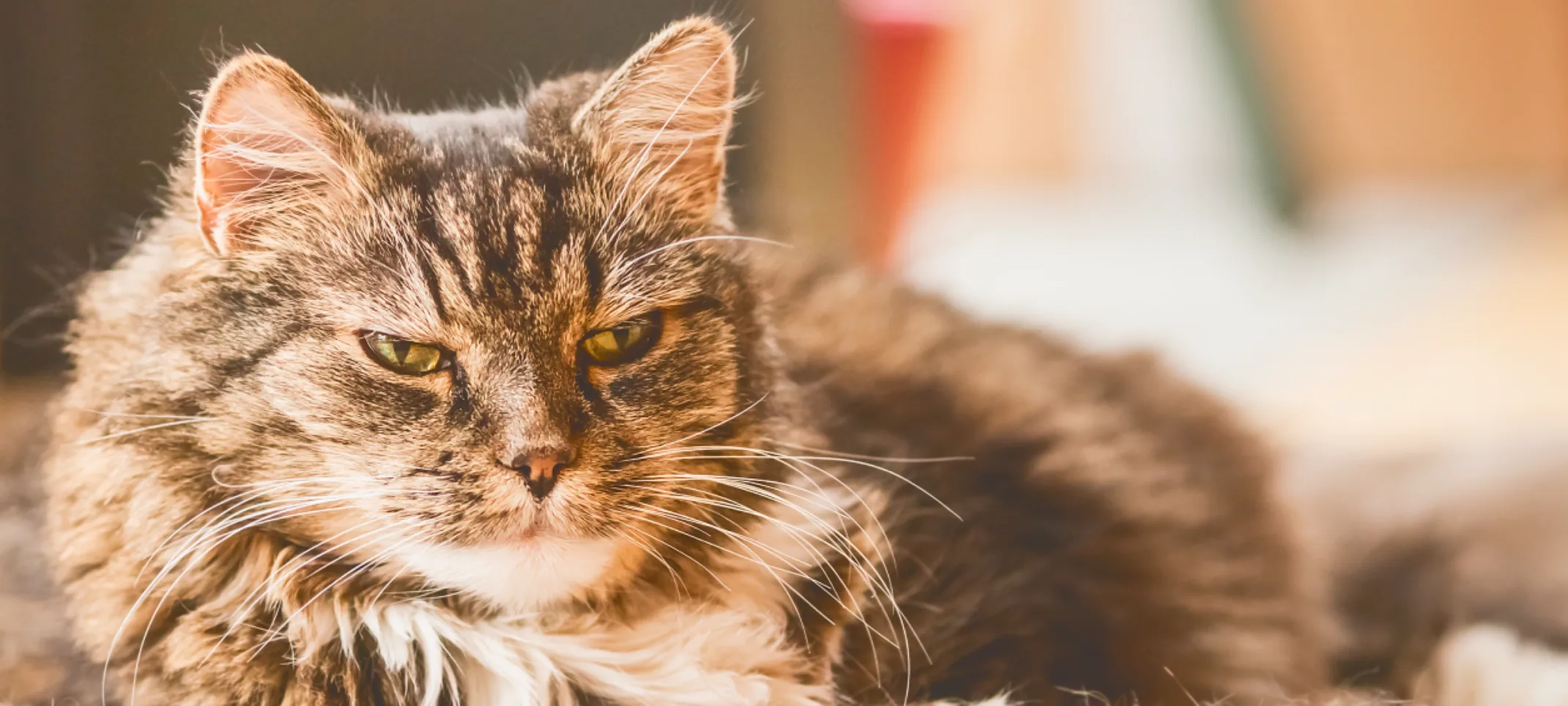Animal Medical Center of Mt. Pleasant
Feline Hyperthyroid Treatment
Hyperthyroidism is recognized as the most common endocrine disorder in cats. It occurs in middle-aged cats, with an average age of thirteen. The thyroid gland produces hormones that regulate much of the body's metabolism.

In hyperthyroidism, hyperplasia of one or both thyroid glands causes excess production of hormones, which causes overstimulation of multiple organ systems.
This overstimulation results in the symptoms typically seen in the hyperthyroid cat: anxiety, irritability, hyperactivity, increased appetite, cardiac arrhythmias (potentially fatal), and vomiting (often severe). Without action, these symptoms will progressively worsen over time and studies show that less than 2% of hyperthyroid cats receive any treatment.
Treatment Options
The three accepted treatment options are described below:
Tapazole (Methimazole, Felimazole)
An anti-thyroid treatment is given orally which blocks thyroid hormone production. It does not cure the disease, so in order to be effective, this treatment must be given for the life of the cat. Possible side effects of tapazole therapy include vomiting, lethargy, loss of appetite, and various blood diseases. The most common reasons for the failure of long-term treatment with tapazole are the lack of owner compliance in giving the treatment and the cat’s unwillingness to take It.
Thyroid Gland Surgery
This option Is not without potential problems in hyperthyroid cats. Anesthesia carries higher risk in patients over the age of 12 years which Is the typical age of most hyperthyroid cats. Removal of one thyroid gland can cure the symptoms; however, often tumors develop in the other gland necessitating a second surgery. Cats who have had surgery on both glands often require supplementation (treatments given twice daily) for life.
Radioactive Iodine (I-131)
No anesthesia is required for this treatment and a single injection Is curative in 95-98% of the cats treated. There are no side effects associated with radioactive iodine therapy. This treatment does require a hospital stay of about five days.
Eligibility For Treatment
Medically unstable cats will not be accepted into the Iodine 131 treatment. This will include cats who are in renal failure or are in decompensated heart failure. We accept treatable heart patients who are stable.
Cats who are currently taking anti-thyroid treatment such as Tapazole can be taken off the treatment for at least one week prior to treatment.
Pre-Treatment Evaluation
Laboratory work, x-rays and physical exams can be done by the referring veterinarian. This information must be current. within thirty days of treatment. Diagnostic tests required include:
Complete physical exam
Complete blood count with differential
Serum biochemistry profile
Urinalysis
T4 level at the time of diagnosis
It may also be recommended that chest X-rays, electrocardiogram, and echocardiography be performed in addition to the above laboratory work if there is any indication of an existing heart condition (murmur, arrhythmia, etc.). The cost of the pre-treatment evaluation, if performed at the treatment center, is not included in the treatment cost.
Length of Treatment
Radioactive Iodine Treatment requires a hospital stay of about 5 days. Cats will be admitted to the hospital on a Monday and be discharged typically on a Friday. On the first day of treatment, your cat will be given a single subcutaneous injection of Iodine 131. They are then housed in a special radiation unit at our hospital. Radiation safety regulations require that the patient must be kept in this unit until their level of radiation drops to an acceptable level. By law, once the Iodine 131 injection is given, the treatment may not be discontinued, nor can your cat be released to you until safe levels of radioactivity are reached. Due to stringent DHEC regulations, you may not visit your cat during treatment. The doctors at the Feline Hypothyroid Treatment Center want you to know that we do everything we can to make your cat's stay with us a comfortable and safe experience. We welcome any questions you may have and will endeavor to work with your special needs.
Post Treatment Care
Once your cat Is released to you, it must be confined to your house for two weeks. For these two weeks, it Is required that pregnant women or anyone under 18 years of age must not come in contact with your cat. If necessary, your cat can be boarded at our hospital for two weeks at an additional cost. According to DHEC regulations, your cat may not be boarded at any other facility for these two weeks.
Cat litter must be disposed of daily using gloves and a litter pan liner. We recommend that handling your cat Is kept to a minimum; In keeping with these guidelines, we recommend washing your hands after petting your cat and not allowing him/her to sleep in your bed for the two-week period. It Is fine for your cat to be around your other pets. They can share food, water, and litter boxes. Thyroid levels must be checked at one and three months post-treatment. This bloodwork can be done by the veterinarian who has referred your cat to the treatment center.
